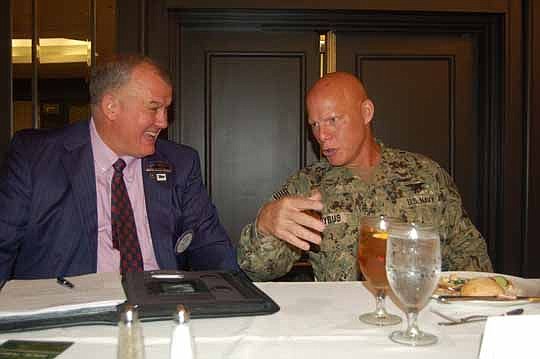
It represents just a small percentage of the U.S. military effort, but special operations is the premier worldwide anti-terror force.
That was part of the information shared Monday with the Rotary Club of Jacksonville by Vice Adm. Sean Pybus, deputy commander of the U.S. Special Operations Command.
The command consolidates Special Operations forces from the Army, Navy, Air Force and Marine Corps.
Pybus said Special Operations accounts for only 2 percent of the U.S. defense budget and has only 35,000 active duty military personnel and about 35,000 civilian employees deployed in 85 countries.
“All of us could fit in a football stadium,” he said.
Much of what the forces accomplish that makes headlines, whether apprehending terrorists or rescuing hostages, is the result of an orchestrated effort and weeks of planning among U.S. forces and allies.
“The real magic is when they work together, which is almost always in combat,” said Pybus.
The main target is the Islamic State of Iraq and al-Sham (ISIS).
Special Operations is “deeply involved” in Iraq and Syria, ascertaining where ISIS leaders operate and live and it appears to be “cropping up” now in Libya, he said.
“ISIS has grown beyond a terror organization into an army that uses terror as a tactic,” said Pybus. “They have declared war on us.”
He predicted it will be 10 years before terror is eradicated, but said Special Operations is currently “more empowered” to go after the enemy.
“By the end of this year, I think you’ll see a radically diminished physical domain of ISIS,” said Pybus.
Commenting on the future of Special Operations, he said the command is evolving and within a few years, the “frogmen” that were the beginning of special operations will be replaced in many instances by technology.
“It’s not your father’s Special Operations,” said Pybus. “The kids with keyboards can do amazing things.”
Relationships are being established with Google and other tech companies to ensure recruitment of Special Operations personnel of the future.
“We have to have the most intelligent, best-educated people on the planet,” said Pybus. “Special Operations will remain special people with special training and special equipment.”
Pybus, who drove from his headquarters at McDill Air Force Base in Tampa to speak to the club, said his impression of Jacksonville as a “Navy town” wasn’t entirely borne out when he arrived.
“The first two people I met were Army and Air Force,” he said. “That speaks to the diversity and talent that’s in Jacksonville.”
(904) 356-2466